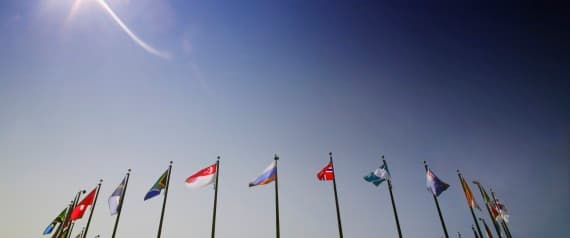United Nations new Sustainable Development Goals do not represent our best interests

Alnoor Ladha | The Rules via Huffington Post
On 25th September world leaders signed the UN’s Sustainable Development Goals (SDGs). They told the world that we’re on track to ending global poverty by 2030, and that we can do it by prioritising economic growth at all costs.
We’ve had decades of chasing economic growth at all costs, and yet there are now more people impoverished than ever before – a full 60% of humanity – and only the rich are getting richer.
If the growth envisaged in the SDGs resembles that seen in recent decades, it will take 100 years for poverty to disappear, not the 15 years the SDGs promise. And even if this were possible in a shorter timescale, we would need to increase the size of the global economy by a factor of 12, which, in addition to making our planet uninhabitable, will obliterate any gains against poverty.
Rather than paper over such obvious madness with false hopes, we must address two critical issues head on: income inequality and endless material growth.
If poverty is to be truly overcome by 2030, then much of the improvement in the position of the impoverished must come through reduction in the enormous inequality that has accumulated in the last 200 plus years. The richest 1 per cent of humanity will very soon own over half of the world’s private wealth. It would take only modest reductions in inequality to deliver large increases in the socio-economic position of the poorer half of humanity.
The SDGs do talk about reducing inequality. However, their prescription is technocratic, obscure and wholly incommensurate to the task at hand. For example, Target 10.1 states that by 2030 they will “progressively achieve and sustain income growth of the bottom 40 per cent of the population at a rate higher than the national average.” It is hard to imagine a less robust or ambitious goal. This commitment allows inequality to grow without limit until 2029, so long as it then begins to be reduced. The SDGs thus fail to endorse the only means that can achieve their stated goal of ending poverty: substantial inequality reduction, starting now. In effect, they perpetuate severe poverty and leave this fundamental problem to future generations.
The other essential task is for the world’s nations to adopt a saner measure of human progress; one that gears us not towards endless GDP growth based on extraction and consumption, but towards the wellbeing of humanity and our planet as a whole. There are plenty of options to choose from, all of which have been ignored in the SDGs. Instead, Target 17.19 says only that they will, “by 2030, build on existing initiatives to develop measurements of progress on sustainable development that complement GDP”. Another urgent challenge passed down to the next generation.
It is possible to overcome poverty in a way that respects the Earth and helps tackle climate change. The planet is abundant in wealth and its people infinitely resourceful. In order to do so, however, we must be prepared to challenge the logic of endless growth, greed and destruction enshrined in neoliberal capitalism.
It is a time to envision a new operating system, based on social justice and symbiosis with the natural world. As currently formulated, the SDGs merely distract us from addressing the scale of the challenges we face.
Signed by:
Noam Chomsky, MIT
Thomas Pogge, Yale University
Naomi Klein, Author and activist
Eve Ensler, Playwright and activist
Chris Hedges, Pullitzer-prize winning journalist and author
Helena Norberg-Hodge, International Society for Ecology and Culture
Anuradha Mittal, Oakland Institute
Tom Goldtooth, Indigenous Environmental Network
Maude Barlow, Author and human rights activist
David Graeber, London School of Economics
Medha Patkar, National Alliance of People's Movments, India
Alnoor Ladha, The Rules
ADD YOUR VOICE AND SIGN THE OPEN LETTER TO THE UN: http://therules.org/petition/sdg-open-letter/
